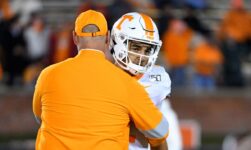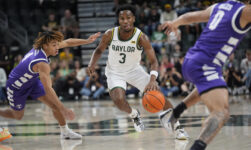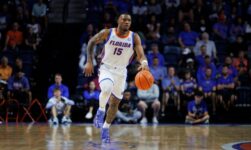A one-of-a-kind revolutionary regular-season men’s basketball event to be staged later this year in Las Vegas is expected to be finalized in the coming weeks, CBS Sports has learned. Its selling point is based on the major factor that has drastically altered college sports over the past three years: name, image and likeness compensation for players.
Games will be played in November under the umbrella of an event dubbed the “Players Era Festival,” which will also include live music and other attractions for fans amid the glitz of the Las Vegas Strip during Thanksgiving week. In a college sports first, the event will also include $1 million NIL payouts for eight participating schools. What’s more, players involved will have future earnings opportunities through long-term NIL contracts, sources told CBS Sports.
Alabama, Houston, Notre Dame, Oregon, Rutgers, San Diego State and Texas A&M are all on board, sources said. The eighth and final school for the 2024 event will emerge from a small group that is still being deliberated.
The Players Era Festival is not being pitched as a one-year happening, either.
Plans are to double the size of the field, sources told CBS Sports, with 16 teams as the target for 2025 and beyond. Duke, Gonzaga, Kansas, Michigan, Syracuse and Virginia have all engaged in discussions about potentially playing in 2025. Sources from a few schools in that group told CBS Sports they anticipate playing in the event if it extends beyond 2024 and continues as planned with 16 teams in 2025. If they opt in, they’d be joined by most (if not eventually all) of the schools playing in 2024, many of which have already signed up for a three-year agreement, according to sources.
Event organizers are in the final negotiating stages with MGM Resorts International to hold games at any or all of its three major venues: T-Mobile Arena, MGM Grand Garden Arena and Michelob ULTRA Arena. The tentative schedule is to play games on Nov. 26, 27 and 29, with Thanksgiving an off-day. The 2024 format(s) for the eight teams has not been decided. Organizers are still weighing whether to have a single eight-team tournament bracket or two separate four-team multi-team events (MTEs).
The tournament would be unique in that the NIL collective of each participating school would be paid $1 million. Additional significant NIL opportunities (believed to be in the neighborhood of another $1 million) would be awarded exclusively to the winner or winners of the event, depending on the final bracket format(s). The money would then be distributed to athletes by the collectives. The athletes, while in Las Vegas, would be required to participate in multiple off-the-court activities to earn that NIL money. That quid pro quo agreement for NIL money is a key distinction and at the core of the appeal of the festival. Pay-for-play remains against NCAA rules. However, athletes can be paid for NIL work surrounding the actual games, which is the pitch here.
“If there are events where there’s an extraordinary amount of money involved, and there’s no donor fatigue involved in this, how do you not play in this?” one coach participating in the Players Era Festival told CBS Sports. “There’s not a decision we make that’s not NIL-driven. I’ll play in the parking lot of Mandalay Bay, just clear the f—ing check.”
The basketball-oriented festival is being put on by EverWonder Studio, a production company based in New York. The tournament will be financially backed by RedBird International Media Investments, a subset of RedBird Capital Partners, a multi-billion-dollar investment firm. RedBird IMI is an investment consortium majority funded by the United Arab Emirates. It is headed by former CNN CEO Jeff Zucker. FrontOffice Sports first reported on the event in March. An official announcement should land in the next 10 days, according to a source.
Broadcast rights are yet to be formally secured; the games are expected to be distributed on a streaming service instead of traditional linear television. The event has come under scrutiny and faced backlash from many in the industry because its emergence poses an existential threat to the traditional November/December MTE television model that’s become more prominent in college basketball in the past 15 years. Some schools in the 2024 field reneged on previous deals with other MTEs, inviting further discord.
Event organizers have assured all involved that the Players Era Festival will be in line with NCAA rules, sources said.
“We will be very good about making sure this is fully compliant,” a source added.
Kelvin Sampson (Houston) and Nate Oats (Alabama) have both agreed to play in the Players Era Festival.
Getty Images
Because the Players Era Festival is aggressively pushing forward in a constantly shifting NIL era of player empowerment — and because it has tens of millions of dollars in private-equity funding — there is skepticism from many in college athletics over its long-term financial viability. Traditionally, even the best MTEs don’t have massive profit margins. The highest-profile regular-season events hope to earn $1-2 million in profits. This would also mark a sea change in college basketball due to private equity investments influencing how teams schedule, thus likely affecting how MTEs in the future are operated.
Schools participating, however, see a landscape-altering opportunity at a time when programs are desperate for any fundraising to bolster recruiting prowess and increase their NIL war chests. Consider: many top-end 2024 transfers in the past month have committed to a variety of programs after being promised north of $1 million, sources said.
“I would play on Nick Jr., I would play on YouTube. It doesn’t matter,” a coach scheduled to play in the event told CBS Sports. “All the other stuff passed through our compliance smell test all the way through. We have not run up against a road block that is a definitive no.”
Said another coach in the event: “As long as they get it compliant, our administration is full-go.” He later said, “You’d be stupid not to do this if you were invited.”
Intersport — a respected/established entity in the sports-event space that annually helps put on the CBS Sports Classic, the Fort Myers Tip-Off and many other events — will be the tournament’s operator. Seth Berger is the tournament director. Berger, 56, is a long-time presence in the basketball space. He’s a high school coach in Philadelphia who most notably founded And1. As a prep coach Berger has won four state titles and coached the likes of former five-star prospects Mohammed Bamba and Cam Reddish. Berger has been the primary recruiter to get teams into the event in 2024 and beyond.
NCAA rules prevent schools from playing in the same MTE more than once in four years; it’s why the same high-profile programs aren’t in the Maui Invitational in back-to-back years, or even once every three years. As a workaround, organizers of the Players Era Festival are intentionally attempting to break off different MTEs with different names to be played at different Vegas arenas in an effort to bring many of the same teams back for multiple years while technically staging them in separate events.
“We are turning this into what NBA All-Star weekend is for the NBA,” one source involved with the event said. “This would be a celebration week for college basketball.”
Players will also be eligible to sign on to a 10% equity stake in Players Era in perpetuity, a source said, meaning that college athletes would earn money with the company moving forward, provided that Players Era continues to grow as an asset in the years ahead. EverWonder Studio is aiming to expand its presence in the live-sports space in the coming years.
“The concept is for NIL activities, it’s not a one-and-done exchange, it’s about long-term value,” a source said. The festival is also considering including a financial literacy program for all teams/players involved.
EverWonder Studio has produced documentaries and docuseries for Netflix, Apple+ and Disney. It’s also produced the CMA Awards, NFL Honors and Oscars Red Carpet Show.
There have also been discussions about trying to make the proposed 16-team event in 2025 into something similar to FIFA’s World Cup format, with group-stage play, but the viability of that model remains unclear. If the event comes to fruition as envisioned, it could spark the start of a landscape-changing trend in college basketball for the rest of this decade, if not beyond.




